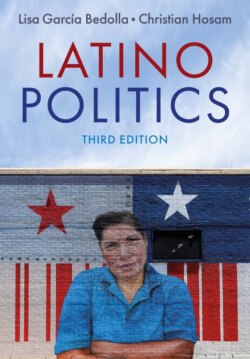Читать книгу Latino Politics - Lisa García Bedolla - Страница 18
US Foreign and Economic Policy and Latino Politics
ОглавлениеThe United States’ relations with Latin America have been deeply affected by two important US principles: manifest destiny and the Monroe Doctrine. The idea of manifest destiny – that the United States was “destined” to be an Anglo-Saxon Protestant nation that stretched from coast to coast – had its roots in colonial political thought. In a letter to his father in 1811, John Quincy Adams wrote:
The whole continent of North America appears to be destined by Divine Providence to be peopled by one nation, speaking one language, professing one general system of religious and political principles, and accustomed to one general tenor of social usages and customs. For the common happiness of them all, for their peace and prosperity, I believe it is indispensable that they should be associated in one federal Union.25
Like Adams, many Americans believed that it was God’s will that the United States should control the North American territory, and that the nation needed to be based on a common set of political ideals, religious beliefs, and cultural practices. This creed was one of the main justifications underlying US territorial expansion through the US–Mexico War. We will see that it also had important consequences for how the US dealt with the incorporation of the Mexican population present in those territories when they were annexed into the United States. Over time, this idea that it was the United States’ destiny to control a particular geographic sphere would expand beyond the North American continent and extend across the western hemisphere through the Monroe Doctrine.
John Quincy Adams developed the Monroe Doctrine in 1823, when he was President James Monroe’s Secretary of State. The main thrust of the doctrine was that, as countries in the Americas were becoming independent from the imperial European powers, the United States did not want Europe to recolonize the western hemisphere. In his State of the Union message in December of that year, President Monroe declared that the United States would not interfere in European wars or internal affairs, and expected Europe to stay out of the affairs of the new world. European attempts to influence the new world would be interpreted by the United States as threats to its “peace and safety.”
President James Polk invoked the principle of manifest destiny and the Monroe Doctrine in an 1845 address to Congress in support of westward expansion into Mexican territory. In 1904, President Theodore Roosevelt added the “Roosevelt corollary” to the Monroe Doctrine, which defined US intervention in Latin American domestic affairs as necessary for US national security:
All that this country [the United States] desires is to see the neighboring countries stable, orderly, and prosperous. Any country whose people conduct themselves well can count upon our hearty friendship. If a nation shows that it knows how to act with reasonable efficiency and decency in social and political matters, if it keeps order and pays its obligations, it need fear no interference from the United States. Chronic wrongdoing, or an impotence which results in a general loosening of the ties of civilized society, may in America, as elsewhere, ultimately require intervention by some civilized nation, and in the Western Hemisphere the adherence of the United States to the Monroe Doctrine may force the United States, however reluctantly, in flagrant cases of such wrongdoing or impotence, to the exercise of an international police power.26
This corollary was used to justify US intervention in Cuba, Haiti, Nicaragua, and the Dominican Republic. It was officially reversed in 1934 with the advent of Franklin D. Roosevelt’s “good neighbor” policy toward Latin America. Yet the principle that the United States’ political and economic interests are intimately related to those of Latin America remained. Throughout the twentieth century, the United States’ economic interests played a central role in the development of Latin American banking, infrastructure, and industry. Similarly, the US government, particularly after the start of the Cold War, continually intervened in Latin American internal governmental and military affairs.
This US involvement is critically important for understanding Latino migration flows to the United States. Many Latin American migrants worked for US companies in their home countries. Many were directly recruited by those companies to come to the United States, and those companies often lobbied the US Congress to ensure that these migration flows would continue. The economic development policies pursued by Latin American governments, and therefore the economic opportunities available to their populations, particularly employment, often were strongly influenced by the US financial sector and by the US government. After the advent of the Cold War, US strategic concerns and levels of military aid often affected the success or failure of social movements to redistribute wealth in these countries. Thus, the way the United States expressed its political and economic interests in the region affected the Latin Americans’ economic and political situation on the ground, the facility with which they were able to migrate to the United States, and the legal terms under which they were accepted (or not) under US immigration policy.
